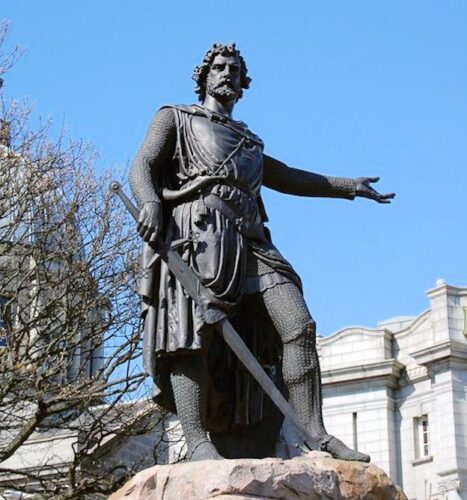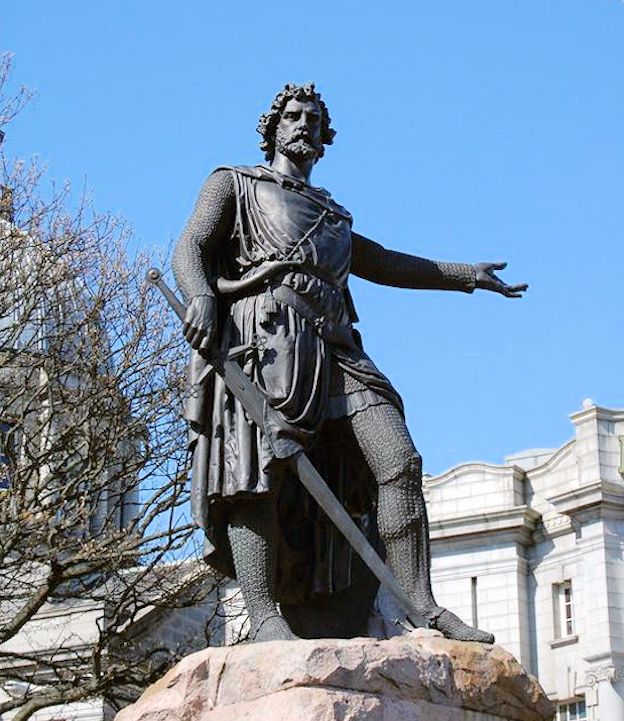
Scotland history and future, an article to discover some curiosities of the Scottish history with its characters and some news on its possible future in Europe.
The moment you doubt whether you can fly, you cease for ever to be able to do it.
J. M. Barrie, Peter Pan
Of all the small nations of this earth, perhaps only the ancient Greeks surpass the Scots in their contribution to mankind.
Winston Churchill
I’m William Wallace, and the rest of you will be spared. Go back to England and tell them… Scotland is free!
William Wallace
Let us do or die.
Robert Burns (1759-1796, Scottish poet)
We look to Scotland for all our ideas of civilisation.
Voltaire
Your heart is free. Learn to follow it.
William Wallace
Oats. A grain, which in England is generally given to horses, but in Scotland supports the people.
Samuel Johnson
No one provokes me with impunity.
Mary Queen of Scots (1542-1587, Queen of Scotland)
Don’t be penny wise and pound foolish.
Scottish Proverb (Sayings of Scottish origin)
Give your tongue more holiday than your head.
Scottish Proverb (Sayings of Scottish origin)
A well-written life is almost as rare as a well-spent one.
Thomas Carlyle (1795-1881, Scottish philosopher, author)
Few Americans have heard of Wales. All of them have heard of Ireland and many of them think they are Irish. Scotland gets a sort of free pass, especially since Braveheart re-established the Scots anti-English credentials among the ignorant millions who get their history off the TV.
Peter Hitchens
Scotland has been inhabited for about 8000 years, but very little is known of its early history. The Romans called it “Caledonia” and tried many times to conquer the country, but were never able to do so. Finally the Emperor Hadrian built a defensive wall across the width of Britain to protect the Roman communities in the north of England from attacks by hostile warring tribes in Scotland – or Caledonia. Hadran’s wall represented the northern most boundary of the Roman Empire.
The first great hero to be remembered of the Scottish history is Sir William Wallace (1272 – 1305). Wallace had killed the English Sheriff of Lanark who had apparently murdered Wallace’s sweetheart. A price was put on his head, so Wallace took the bold course and raised the Scottish Standard. Supported by a few of the Scots barons, he inflicted a resounding defeat on the English at Stirling Bridge in 1297. The jubilant Scots made him Guardian of Scotland but their joy was short-lived.
But then Wallace made a fatal mistake; he took on the English Army who greatly outnumbered his men, and in a pitched battle at Falkirk in 1298, Edward I of England annihilated the Scots battalions and Wallace became a fugitive for 7 years.
While in Glasgow in 1305 he was betrayed and taken to London where he was tried for treason in Westminster Hall. He was one of the first to suffer the fearsome penalty of hanging, drawing and quartering. His head was “spiked” on London Bridge and fragments of his body distributed among several Scottish cities as a grim reminder of the price of revolt.
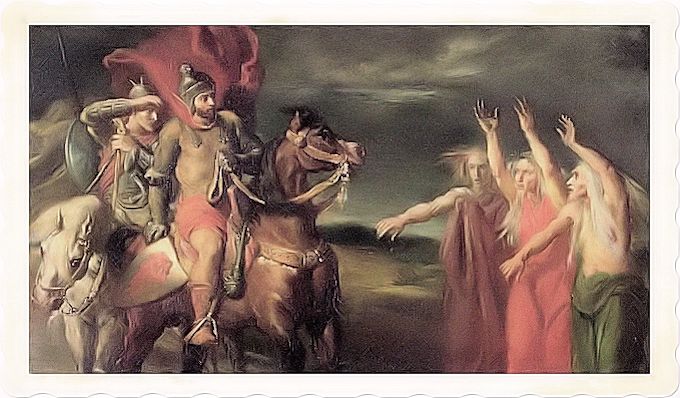
Historians are in disagreement as to whom was the first king of Scotland. In any case the Scottish monarchy was weak and somewhat disorganised. Whereas in most monarchies the king’s eldest son automatically succeeds his father upon the latter’s death, the Scots followed a system whereby the king was allowed to nominate anyone he wished of the blood royal to become his successor.
This may sound a more democratic plan, but unfortunately in practice it often led to the king’s early death, arranged by an ambitious and impatient nominee. Such was the case with King Duncan, who was killed by his cousin Macbeth, in order to obtain the crown of Scotland.
Macbeth was not unique in Scottish history, and this 11th century king would probably have remained obscure had it not been for Shakespeare’s great play, which immortalised him and his power-crazed wife. Shakespeare somewhat fictionalised the story and slandered the king, for the real Macbeth slew his cousin in battle and not in bed, and that is somehow more morally acceptable. Shakespeare’s version is, however, more exciting.
Tomorrow, and tomorrow, and tomorrow,
Creeps in this petty pace from day to day
To the last syllable of recorded time;
And all your yesterdays have lighted fools
The way to dusty death. Out, out, brief candle!
Life’s but a walking shadow, a poor player
That struts and frets his hour upon the stage
And then is heard no more. It is a tale
Told by an idiot, full of sound and fury,
Signifying nothing.
Macbeth by William Shakespeare
The kings and queens of Scotland have always been somewhat ill-fated in their reigns, and none more so than Mary Stuart. She became Queen of Scots almost as soon as she was born. By the age of 17 she was also Queen of France by marriage to King Francis II who claimed for Mary the throne of England as well, calling Elizabeth I a bastard. Elizabeth never forgave her cousin Mary for this insult.
At 18, Mary was a charming widow and returned to Scotland to take over her realm, but she found herself in the extraordinary position of being a Roman Catholic Queen reigning in a solidly Protestant country. In fact at this time the Catholic mass was forbidden everywhere in Scotland except at Mary’s court. How had such a strange thing happened? While Mary was in France, the Reformation swept Europe and a Scotsman, John Knox, had learned his religion from the Swiss theologian, Calvin. Knox took his own brand of Calvinism back to Scotland and formed the Presbyterian Church, which is, to this day, the established Church of Scotland, and one of the most common Protestant sects all over the English speaking world. Knox abolished bishops and priests and preached simplicity and free universal education, which was an idea undreamt of at that time.
Mary Queen of Scots, after two further marriages which were both disasters, was deposed and imprisoned. She escaped and fled to England, only to be caught and imprisoned again by Queen Elizabeth, who eventually ordered Mary’s execution on the grounds of treason. Mary Stuart was beheaded at the age of 45, and perhaps the way she faced her death was the finest and most successful moment of her unhappy life. Mary’s son became King James VI of Scotland, and upon the death of Elizabeth Tudor, he also became James I of England and Wales, thereby uniting the three countries of Britain under one crown

To the Scots, the most romantic of the Stuarts was Mary’s great grandson, Prince Charles Edward, known as “The Young Pretenders” or sometimes “The Young Chevalier” but most affectionately called “Bonnie Prince Charlie”. Prince Charlie or “Chairly” as the Scots pronounce it… was born in exile in Rome but claimed the crown of Great Britain for the Stuarts.
In 1745, when the Prince was 25 years old, he arrived in Scotland for the first time in his life and formed a Highland army to march on London and depose the Hanoverian King, George II. Because of his great charm, youth, good looks and, to many Scots, noble cause, Bonnie Prince Charlie became an immediate folk hero.
Prince Charles, with his 5,000 Highlanders, invaded England and actually got within 200 kilometres of London before retreating to Scotland. King George’s forces chased the Highlanders and defeated them in battle at Culloden. Bonnie Prince Charlie, with the help of a young woman called Flora Macdonald, escaped bye boat to the Isle of Skye, where he was able to hide from the King’s troops. When Dr. Johnson and James Boswell visited the Isle of Skye only 27 years after this event, they were the guests of Flora Macdonald and heard a first-hand account of the famous escape.
In spite of one of the most intensive manhunts in all history, Bonnie Prince Charlie eluded the Government forces and fled to France with a hundred or so of his faithful Highland chiefs. He tried to persuade the governments of France and Spain to back his claim to the throne of Great Britain, but it was in vain. In Scotland his supporters, known as Jacobites, waited for the triumphal return of their “king across the water”
Bonnie Prince Charlie never set foot in Scotland again. He died in Rome an alcoholic and was buried in the crypt of St. Peter’s. Thus ended nearly 400 years of the Stuart dynasty. As a touching tribute, King George IV of Great Britain gave a large sum of money to the famous sculptor Canova to create a monument to Prince Charles Edward Stuart, the legendary “Young Pretender” who had tried so hard to depose the King’s grandfather.
As a result of the Jacobite uprising of 1745-1746 the British Government disarmed the Highlanders, forbade the wearing of plaids and tartan kilts, and destroyed the clan system for all time. Clan is a Gaelic word for “family” and the area of Scotland had been divided into sections for each of the main clans, but these “families” were often fierce, warring tribes who not only fought the Government, but fought and killed each other, often with great vindictiveness and cruelty. Many a MacGregor went off to fight the Campbells or the Colquhouns and never returned to their loved ones.
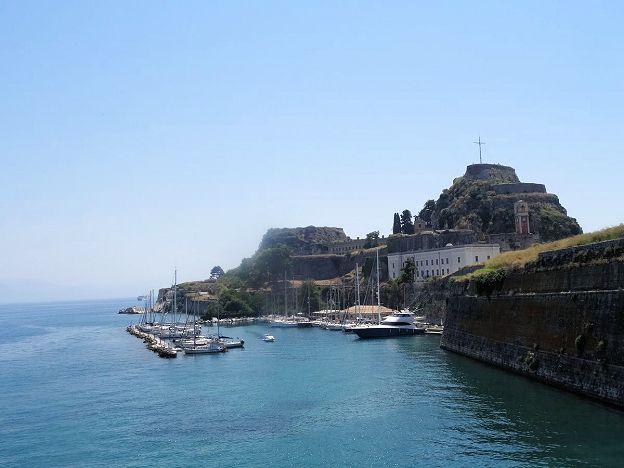
On his visit to the Highlands. Dr Johnson wrote vividly about clan warfare: “In the Highlands it was a law that if a robber was sheltered from justice, any man of the same clan might be taken in his place. This was a kind of irregular justice which could hardly fail to end in d feud.
The cave is now to be seen to which one of the Campbells, who had injured the Macdonalds, retired with a number of his own clan. The Macdonalds demanded the offender and, being refused, made a fire at the mouth of the cave by which he and his adherents were all suffocated together.
As Boswell and I sat at Sir Alexander Macdonald’s table on the Isle of Skye, we were entertained according to the ancient custom of the north, with the melody of the bagpipe. As the bagpipe was playing, an elderly gentleman informed us that in some remote time the Macdonalds were offended by the inhabitants of Culloden and, resolving to have justice or vengeance, came to Culloden on a Sunday where, finding their enemies at worship, they shut them up in the church, which they set on fire; and this, said he, is the tune the piper played while they were burning.
Narrations like this deserve the notice of the traveller, because they are the only records of a nation that has no historians, and afford the most genuine representation of the life and character of the ancient Highlanders.
Now, in 1773, the clans retain little of their original character, their ferocity of temper is softened: their military ardour is extinguished, their dignity of independence is depressed, their contempt for government subdued. and the reverence for their chiefs abated. Of what they had before the late conquest of their Country, there remain only their language and their poverty.
Journey to the Western Islands of Scotland (Dr. Johnson)
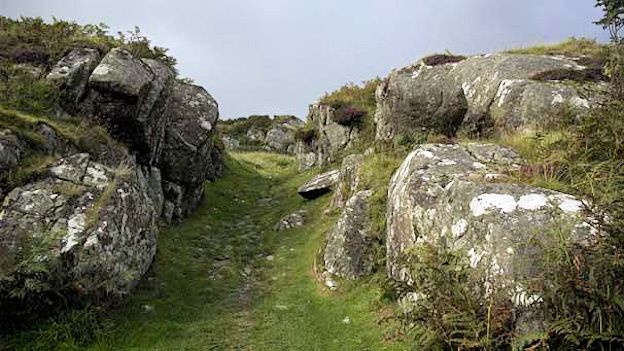
The House of Windsor, the present Royal Family of Great Britain, are directly descended from the very first Stewart King of Scotland. Although Queen Elizabeth and her family live in England, they maintain the closest links with Scotland. The Queen Mother is from a long line of Scottish aristocracy and spent her childhood at Glamis Castle, where Macbeth was born 900 years before. Later, the Queen Mother returned to Glamis Castle to give birth to her second daughter, Princess Margaret.
The Queen’s husband, the Duke of Edinburgh, and all three of the Queen’s sons were educated in Scotland, and the family spends their annual summer holiday at their Highland Castle, Balmoral, where they often wear the traditional kilt in Royal Stewart tartan. Balmoral Castle, which Queen Victoria called her “dear paradise”, was bought for her by Prince Albert in 1852, and has since been the private personal property of her descendants. With as much mist and rainfall as Scotland has, it may seem odd that the Royal Family chooses the Scottish Highlands for their holidays – but then it doesn’t always rain in Scotland – it just seems like it. And sometimes the weather can be very surprising indeed. Here’s what Queen Victoria wrote to the King of Belgium:
Balmoral Castle, 16 September 1861
My dearest Uncle, I was out the whole day with Albert, in the forest in a perfectly tropical heat! Since we went to our little bothy near Loch Mulch on the 12th, the heat of the sun has been daily increasing, and has reached a pitch which makes it almost sickening to be out in it, though it is beautiful to behold. The sky these last two evenings has been like an Italian one, and for the last few days – well at least the last four without slightest particle of cloud, and the sun blazing. With this, not a breath of air.
The mountains look quite crimson and lilac, and everything glows with the setting sun. The evenings are quite a relief. Really one cannot undertake expeditions, the heat is so great. We thought of you, and wished you could be here: you would fancy yourself in Italy. I love my peaceful, wild Highlands, the glorious scenery, the dear good people who are much attached to us. I must hastily conclude, hoping to hear from you that you will come. Our moonlights have been magnificent also. Ever your devoted niece, Victoria
Letters of Queen Victoria
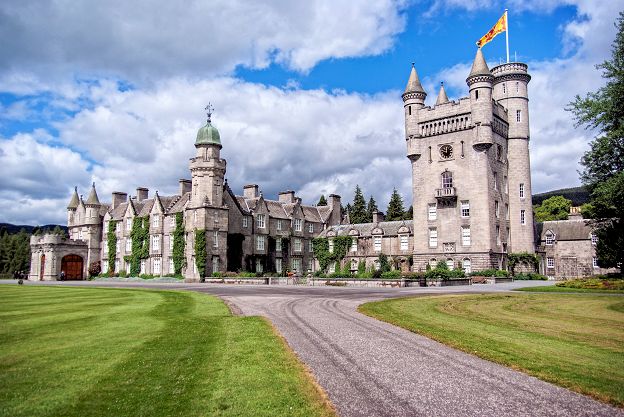
Today Scotland is better represented in the British Parliament than either England or Wales, having one member of Parliament for every 50,000 voters. In the past 100 years, seven Prime Ministers of Britain have been Scotsmen; the most recent being Harold Macmillan and Sir Alec Douglas Home. Nevertheless, there is a Scottish Nationalist Party which would like to see home rule from Edinburgh. In 1979 the British Government held a referendum to allow the Scots to choose. If 40% of the voters wanted a separate Scottish Parliament the Government promised to set it up. In fact nearly 31% of all Scottish voters rejected the idea of a parliament, and less than 33% were in favour… so nationalist hopes were dashed.
At the last independence referendum, in September 2014, Scots voted 55% to 45% to remain in the U.K., in part because of an agreement by the government at the time to cede more power to Edinburgh over such things as taxation. The latest polls show support for independence is now comfortably above 50%. A pro-independence majority in next spring’s Scottish election would mean the U.K. government could no longer rely on its position that the 2014 referendum was a “once in a generation” vote, according to Jess Sargeant, a senior researcher at the Institute for Government. “There is a risk that if the U.K. government just looks like it’s saying no, that it looks like its resisting the will of the Scottish people, then that might possibly drive support for independence.
Scotland voted against leaving the European Union and protracted talks on a post-Brexit trade deal have fueled support for the nation of 5.5 million to call time on the three-centuries-old union with England and Wales. Because Scotland and Northern Ireland want to remain part of the E.U., there is the quite real possibility that Scotland and even Northern Ireland might now choose to go their own way on membership within the E.U. and the “United Kingdom” would suddenly effectively be only England and Wales.
So we can conclude this short article with the Scottish song that is sung the world over at the close of parties, conferences and all kinds of pleasant occasions, but particularly at midnight on what the Scots call Hogmanay – the 31st of December, known to the rest of the world as New Year’s Eve. “Should auld acquaintance be forgot And never brought to mind Should auld acquaintance be forgot And days of auld lang syne. For auld lang syne, my dear, For auld lang syne, We’ll take a cup of kindness yet For auld lang syne.” The original words in Scottish dialect are by Robert Burns, and they mean “Let’s not forget old friends, nor good times in the past… let’s drink a toast to one another, for old time’s sake”.
If you want to find out more about Scotland you can also read:

